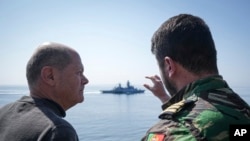On October 22, Russia's Foreign Ministry summoned the German ambassador in Moscow to express a “strong protest” over Berlin’s new military base in the former East Germany.
A day before, on October 21, Germany inaugurated a navy headquarters in Rostock, a northern city on the coast of the Baltic Sea.
In a statement published on the Foreign Ministry’s website, Russia compared the creation of the base to the pre-WWII Nazi militarization of Germany, accusing Berlin’s “curators in Washington” of “historical amnesia” and of being “direct accomplices” in Germany’s “infringement” of a Cold War-era treaty dubbed the Two Plus Four Agreement.
The United States, Britain, France and the Soviet Union, together with East and West Germany, finalized the treaty in 1990 in New York. It granted Germany full sovereignty and reunified the nation, which had been divided into a Soviet-controlled East and a pro-Western West after World War II.
“The creation, at Berlin’s initiative, of a regional NATO maritime command headquarters at the German navy base in Rostock, East Germany … constitutes gross violation of the spirit and letter of the Two Plus Four Agreement, Article 5, paragraph 3 of which mandates Germany to prevent the stationing and deployment of foreign armed forces on the territory of the former East Germany,” the Russian Foreign Ministry stated.
That is misleading.
The Treaty’s Article 5, paragraph 3 regards the time frame following the withdrawal of the Soviet troops from Germany. It states that “Following the completion of the withdrawal of the Soviet armed forces ... units of German armed forces assigned to military alliance structures in the same way as those in the rest of German territory may also be stationed in that part of Germany, but without nuclear weapon carriers. Foreign armed forces and nuclear weapons or their carriers will not be stationed in that part of Germany or deployed there.”
That seemed to confirm the accuracy of the Russian Foreign Ministry’s claim.
However, the ministry omitted a key part of the treaty: Article 6, which states that the conditions of Article 5, paragraph 3 no longer apply after Germany joins an alliance.
“The right of the united Germany to belong to alliances, with all the rights and responsibilities arising therefrom, shall not be affected by the present Treaty.”
The navy headquarters in Rostock is a German national headquarters led by a German admiral.
While Germany’s national operations staff DEU MARFOR, established at the German navy headquarters in 2019, provides the core of the personnel, officers from other NATO countries will also be serving on the base.
“The new multinational Baltic headquarters ... has the capability to perform tasks for NATO. The German authorities have made clear that it does not violate the treaty in any way,” Commander Arlo Abrahamson, spokesperson for NATO Maritime Command, told VOA in written comment.
“Germany is a sovereign country under the Two Plus Four Treaty and can use its armed forces on its territory as it wishes,” Abrahamson said.
German Minister of Defense Boris Pistorius, present at the inauguration, stressed the base’s importance for the security of the Baltic region, which he said, “is inseparable from the security of all of Europe.”
“The importance of the region has become even more evident against the background of the ongoing Russian aggression in our immediate neighborhood,” Pistorius said, referring to Russia’s war in Ukraine.
Estonia, Latvia and Lithuania, NATO members that are hemmed in by the Baltic Sea, Russia and Moscow ally Belarus, say they are particularly vulnerable. The Baltic States were formerly occupied by the Soviet Union and view NATO membership as a means of maintaining their security and independence.
The facility at Rostok will play an important role in their defense.
That base, NATO says, has two core missions: “to plan maritime exercises and operations and to lead naval forces assigned by NATO in times of peace, crisis and war.”
The base will also play “a key role in fostering cooperation between the allied navies in the Baltic Sea region.”
NATO’s Abrahamson told VOA that Russia’s war against Ukraine prompted NATO to increase its presence in the Baltic region.
“The new multinational headquarters, based on the German Navy Command in Rostock, will bolster NATO’s defense readiness in the Baltic Sea region. It will protect trade routes and critical infrastructure. And it will be capable of leading operations for NATO, if required,” Abrahamson said.





